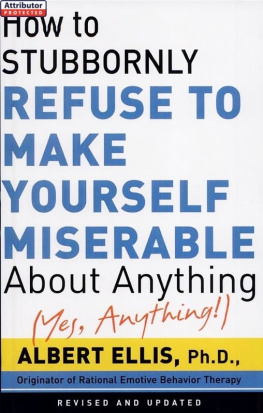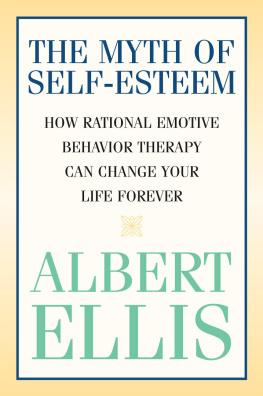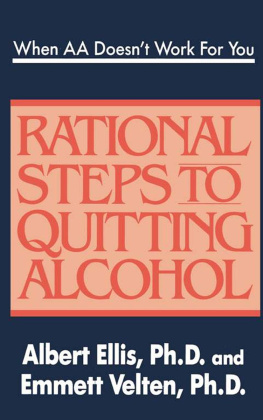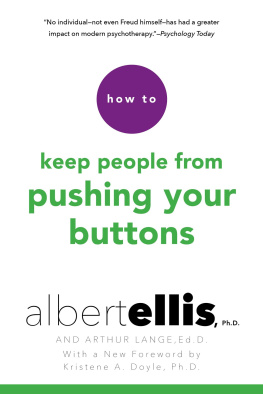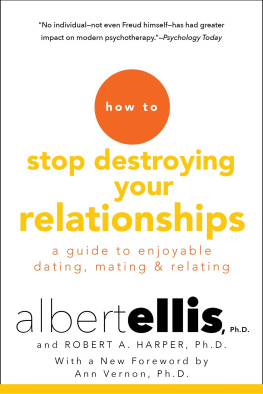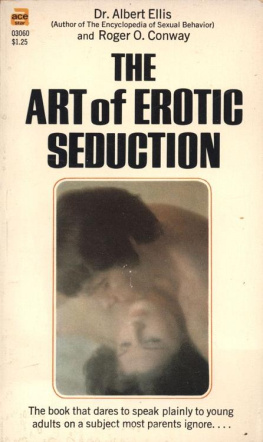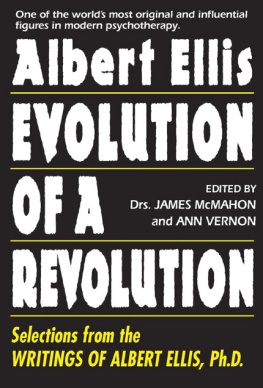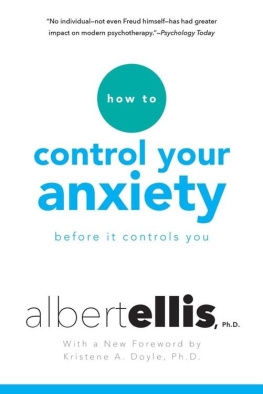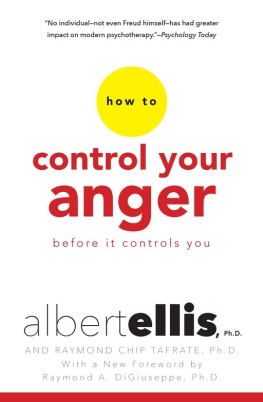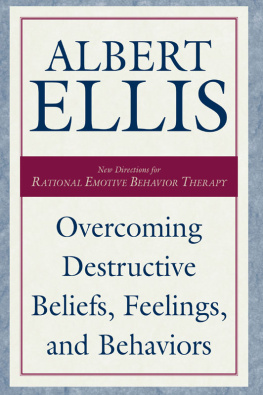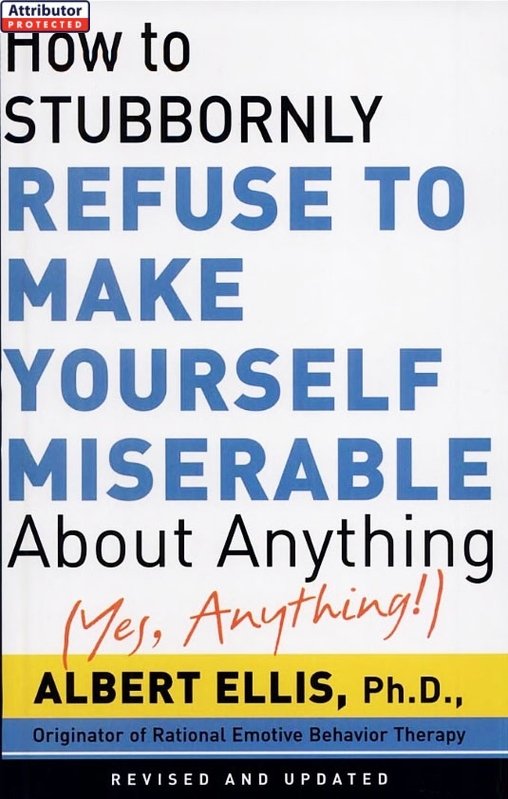Acknowledgments
I would like to acknowledge the collaboration of the many clients and workshop participants whose cases I anonymously mention in this book.
I also greatly appreciate the constructive criticism of Emmett Velten, Shawn Blau, and Kevin Everett FitzMaurice, who read and commented on the manuscript of this book but who are not responsible for any of its contents. Many thanks!
Finally, I would like to acknowledge Tim Runion, who did a fine word processing job.
A partial list of books and monographs by Albert Ellis
Anger: How to Live With and Without It
How to Live With a Neurotic
Sex Without Guilt
The Art and Science of Love
A Guide to Rational Living (with Robert A. Harper)
Creative Marriage (paperback edition title: A Guide to Successful Marriage ) (with Robert A. Harper)
Reason and Emotion in Psychotherapy
How to Stubbornly Refuse to Make Yourself Miserable About AnythingYes, Anything!
Executive Leadership: A Rational Approach
Humanistic Psychotherapy: The Rational Emotive Approach
Overcoming Procrastination (with William Knaus)
A Garland of Rational Songs
A Guide to Personal Happiness (with Irving Becker)
Overcoming Resistance
How to Keep People From Pushing Your Buttons (with Arthur Lange)
The Practice of Rational Emotive Behavior Therapy (with Windy Dryden)
How to Control Your Anxiety Before It Controls You
How to Control Your Anger Before It Controls You (with Raymond Chip Tafrate)
When AA Doesnt Work for You: Rational Steps for Quitting Alcohol (with Emmett Velten)
Making Intimate Connections (with Ted Crawford)
How to Make Yourself Happy and Remarkably Less Disturbable
Feeling Better, Getting Better, and Staying Better
Overcoming Destructive Beliefs, Feelings, and Behaviors
How to Stop Destroying Your Relationships (with Robert Harper)
Counseling and Psychotherapy With Religious Persons (with Stevan Nielsen and W. Brad Johnson)
Case Studies in Rational Emotive Behavior Therapy With Children (with Jerry Wilde)
Appendix: The Biological Basis of Human Irrationality
Before stating any hypothesis about the basis of human irrationality, definitions of the main terms employed in this appendix, biological basis and irrationality, are presented . Biological basis means that a characteristic or trait has distinctly innate (as well as distinctly acquired) originsthat it partly arises from the organisms natural, easy predisposition to behave in certain stipulated ways. This does not mean that this characteristic or trait has a purely instinctive basis, that it cannot undergo major change; nor does it mean that the organism would perish, or at least live in abject misery, without it. It simply means that, because of its genetic and/or congenital nature, an individual easily develops this trait and has a difficult time modifying or eliminating it.
Irrationality means any thought, emotion, or behavior that leads to self-defeating or self-destructive consequencesthat significantly interferes with the survival and happiness of the organism. More specifically, irrational behavior usually has several aspects:
The individual believes, often devoutly, that it accords with the tenets of reality although in some important respect it really does not.
People who adhere to irrational behavior significantly denigrate or refuse to accept themselves.
Irrational behavior interferes with their getting along satisfactorily with members of their primary social groups.
Irrational behavior seriously blocks their achieving the kind of interpersonal relations that they would like to achieve.
Irrational behavior hinders their working gainfully and joyfully at some kind of productive labor.
Irrational behavior interferes with their own best interests in other important respects.
The major hypothesis of this appendix is as follows: Humans ubiquitously and constantly act irrationally in many important respects. Just about all of them do so during all their lives, though some considerably more than others. There is, therefore, some reason to believe that they do so naturally and easily, often against the teachings of their families and their culture, frequently against their own conscious wish and determination. Although modifiable to a considerable extent, their irrational tendencies seem largely ineradicable and intrinsically go with their biological (as well as sociological) nature.
This hypothesis goes back to the statements of some of the earliest historians and philosophers and has received adequate documentation over the years by a host of authorities, such as J. G. Frazier, Claude Levi-Strauss, Eric Hoffer, Walter B. Pitkin, and O. Rachleff. R. S. Parker noted that most people are self-destructive, they behave in ways that are obviously against their best interest. Nonetheless, whenever I address an audience of psychologists or psychotherapists and point out this fairly obvious conclusion and state or imply that it arises out of the biological tendency of humans to behave irrationally, a great many dyed-in-the-wool environmentalists almost always rise with horror, foam at the mouth, and call me a traitor to objective, scientific thinking.
Hence this appendix. Following is a brief summaryfor the amount of supporting evidence assumes overwhelming proportions and would literally take many volumes to summarize properlyof some of the main reasons behind the thesis that human irrationality roots itself in basic human nature. The summary is confined to outlining the multiplicity of major irrationalities and to giving some of the logical and psychological reasons why it seems almost certain that they have biological origins.
First are listed some of the outstanding irrationalities among the thousands collected over the years. The following manifestations of human behavior certainly do not appear completely irrationalfor they also have (as what behavior has not?) some distinct advantages. Some people, such as those Eric Hoffer calls true believers, will even hold that many of them bring about much more good than harm. Almost any reasonably objective observer of human affairs, however, will probably tend to agree that they include a large amount of foolishness, unreality, and danger to our survival or happiness.
Custom and Conformity Irrationalities
a. Outdated and rigid customs
b. Ever-changing, expensive fashions
c. Fads and popular crazes
d. Customs involving royalty and nobility
e. Customs involving holidays and festivals
f. Customary gifts and presentations
g. Customs in connection with social affairs and dating
h. Courtship, marriage, and wedding customs
i. Puberty rites, bar mitzvahs, etc.
j. Academic rites and rituals
k. Hazings of schools, fraternal organizations, etc.
l. Religious rites and rituals
m. Customs and rites regarding scientific papers
n. Circumcision conventions and rituals
o. Rigid rules of etiquette and manners
p. Blue laws
q. Strong disposition to obey authority, even when it makes unreasonable demands
Ego-Related Irrationalities
a. Tendency to deify oneself

